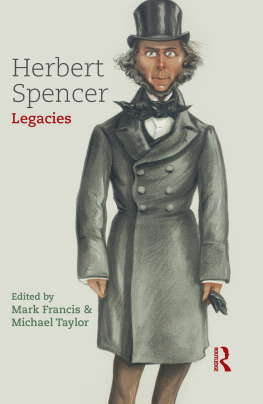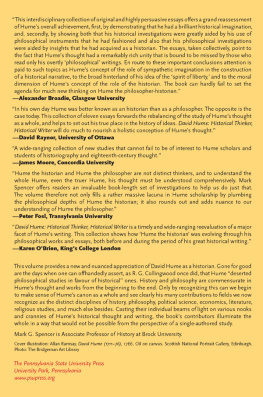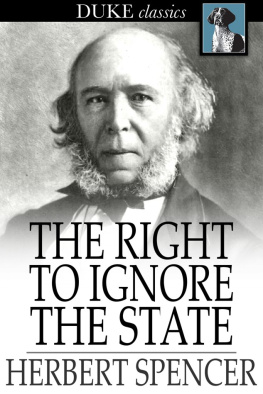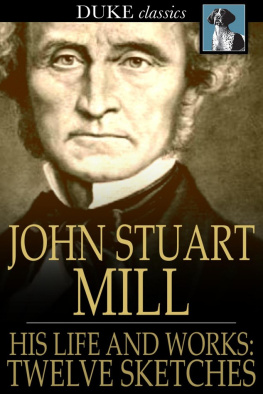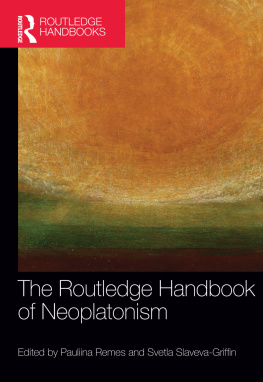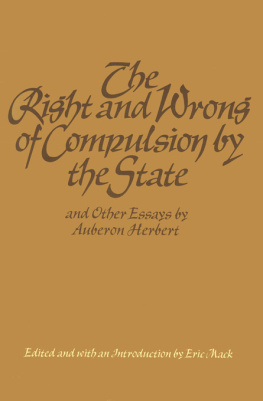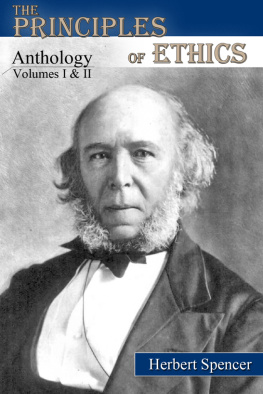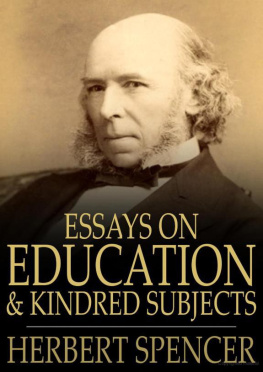
HERBERT SPENCER
ALSO BY MARK FRANCIS
Herbert Spencer and the Invention of Modern Life (Acumen)
HERBERT SPENCER
Legacies
Edited by
Mark Francis
and
Michael W. Taylor

First published 2015
by Routledge
2 Park Square, Milton Park, Abingdon, Oxon OX14 4RN
and by Routledge
711 Third Avenue, New York, NY 10017
Routledge is an imprint of the Taylor & Francis Group, an informa business
2015 Mark Francis and Michael W. Taylor; individual chapters, the contributors
The right of Mark Francis and Michael W. Taylor to be identified as the authors of the editorial matter, and of the individual authors for their contributions, has been asserted in accordance with sections 77 and 78 of the Copyright, Designs and Patents Act 1988.
All rights reserved. No part of this book may be reprinted or reproduced or utilised in any form or by any electronic, mechanical, or other means, now known or hereafter invented, including photocopying and recording, or in any information storage or retrieval system, without permission in writing from the publishers.
Trademark notice: Product or corporate names may be trademarks or registered trademarks, and are used only for identification and explanation without intent to infringe.
British Library Cataloguing in Publication Data
A catalogue record for this book is available from the British Library
Library of Congress Cataloguing in Publication Data
A catalog record for this title has been requested
ISBN: 978-1-84465-626-4 (hbk)
Typeset in Minion Pro by Kate Williams, Swansea
CONTENTS
Mark Francis
Stephen Tomlinson
Michael W. Taylor
Jonathan H. Turner
James Elwick
Chris Renwick
John Skorupski
Mark Francis
Vanessa L. Ryan
Peter J. Bowler
Bernard Lightman
Peter J. Bowler is Professor Emeritus of the history of science at Queens University, Belfast. He is a Fellow of the British Academy and former president of the British Society for the History of Science. He has published several books on the history of evolutionism, the most recent of which, Darwin Deleted (2013), argues that evolutionary theories could have developed in the late nineteenth century without the idea of natural selection.
James Elwick is Assistant Professor in the Science and Studies Department and in the Division of Natural Science at York University in Toronto, Canada. In addition to working on Herbert Spencer, he studies the history of science education particularly examinations as well as the history of biology. He also coordinates the John Tyndall Correspondence Project, which is publishing the collected letters of this nineteenth-century physicist (who was one of Spencers fellow X-club members).
Mark Francis is Professor of Political Science at the University of Canterbury, Christchurch, New Zealand. He has been Fowler Hamilton Senior Research Fellow at Christ Church, Oxford and Rutherford Scholar at Trinity College, Cambridge. His publications include Herbert Spencer and The Invention of Modern Life (Acumen, 2008) and Herbert Spencer in The Wiley-Blackwell Companion to Major Social Theorists (2011).
Bernard Lightman is Professor of Humanities at York University, Toronto, Canada, where he is Director of the Institute for Science and Technology Studies. He is also Editor of the History of Science Societys journal, Isis. His most recent publications include Science in the Marketplace (co-edited with Aileen Fyfe, 2007), Victorian Popularizers of Science (2007) and Evolutionary Naturalism in Victorian Britain (2009). He is currently working on a biography of John Tyndall and is one of the editors of the John Tyndall Correspondence Project.
Chris Renwick is Lecturer in Modern History at the University of York, UK. He works on the history of the biological and social sciences in Britain since the mid-nineteenth century, in particular debates about the relationship between the two fields and their implications for politics and social policy. He has published widely on these topics, including British Sociologys Lost Biological Roots: A History of Futures Past (2012).
Vanessa L. Ryan is Assistant Professor of English at Brown University, USA, specializing in nineteenth-century British literature and culture, with research interests in the history of the novel and science and literature. She is the author of Thinking without Thinking in the Victorian Novel (2012).
John Skorupski studied philosophy and economics at the University of Cambridge, UK. After lecturing at the University of Glasgow he moved to the Chair of Philosophy at Sheffield University in 1984, and to the Chair of Moral Philosophy at Saint Andrews in 1990. His books include John Stuart Mill (1989), English-Language Philosophy 17501945 (1993) and The Domain of Reasons (2010).
Michael W. Taylor has had a varied career as a central banker, a journalist and an academic. He has worked in London, Bahrain, Basel and Hong Kong. In addition to publishing on banking regulation, he has written several works on the history of ideas and philosophy including Herbert Spencer and the Limits of the State (1996) and The Philosophy of Herbert Spencer (2007).
Stephen Tomlinson is Professor of Education at the University of Alabama, USA. His research comprises work in the history and philosophy of educational thought, with a particular focus on the influence of psychological theory. He is the author of Head Masters (2005), an exploration of how phrenology underwrote nineteenth-century efforts to establish a public system of secular schooling and promote child-centred pedagogic practices.
Jonathan H. Turner is Distinguished Professor of Sociology at the University of California at Riverside, USA, and University Professor of the University of California. He is primarily a general theorist but has a number of substantive interests in addition to his desire to restore Herbert Spencers legacy to its proper place in sociological theory. He is the author of thirty-nine books and several hundred research papers, and editor of seven additional books.
Mark Francis
The Spencerian legacy consists of the predisposition to assess both the evolutionary past and future of humanity as progressive. Where this predisposition takes on a scientific guise, it has competed with Darwinian and Lamarckian theories by offering a naturalistic explanation of the development of psychological, biological and sociological mechanisms without reference to natural selection or to an organisms intention to change. When the Spencerian legacy is non-scientific, it holds a position between the utopian and conservative views of the world. Instead of directing humanity towards an ideal future, Spencerianism emphasized that growth was slow, and constrained by past social and political developments. While this sounds like conservatism, it is not: the Spencerian notion of tradition contains no wisdom and offers no guidance; it is simply a set of naturally formed practices and rules. In both its scientific and non-scientific forms, the Spencerian legacy offers hope for the future while denying that there is any way of forcing the direction or rate of change. This Spencerian legacy differs from Spencers own writings in being more optimistic, and less cluttered with echoes from competing doctrines. That is, Spencer himself was as concerned with dissolution and death as he was with evolution and life, and he was occasionally capable, depending on circumstances, of offering Darwinian or Lamarckian arguments as additions, or substitutes, to his own thought. In general, the Spencerian legacy was a purer doctrine than one to which Spencer himself would have adhered.
Next page
